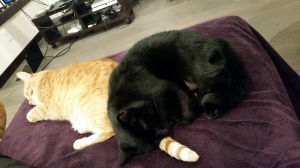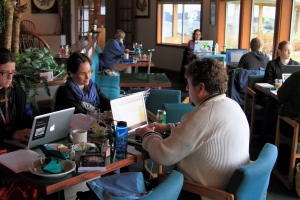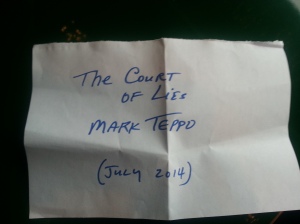I wrote a little bit on Twitter last week about how I’d used my writing process, and more specifically my awareness of it, to troubleshoot a problem with drafting Tea Princess Chronicles, and it occurred to me that might be worth expounding on. So! Here we go.
The most fundamental thing to understand is that your writing process is whatever enables you to meet your writing goals.
For me, my primary goal is completing books. My process is the structure I build into my life to enable me to do that.
Your goal can be pushing your craft limitations, writing consistently, writing at all–whatever you want, provided you have some ability to control it.
(By which I mean, your goal should not be, say, getting published traditionally, or getting fancy movie deals, because notice the passive voice there? Those decisions are reliant on other people; you’re not the agent ultimately in control of them. But setting attainable goals is a blog post for another day.)
If you have a process, yet you’re not meeting your goals? Maybe it’s worked before but isn’t anymore? You can change it. Process isn’t sacred; it evolves with you, your needs, and your stories.
So how do you figure out a process that actually works for you? How do you make it reliable? How do you figure out what’s extraneous?
The summer before I started high school, I decided I was going to actually write a book for the first time. I’d read David and Leigh Eddings’ The Rivan Codex, and I used the process outlined in it for my first attempt. I had a lot of fun but ultimately produced way more world-building documentation than actual story. A learning experience! Happily, the Eddings had the foresight to specify that this was just the process they used and that it should not be taken as gospel, so I didn’t. Instead I started looking up the writers I admired, researching how they worked, and experimenting.
That’s the answer, essentially: experimentation, plus time and work.
The good news is most writers I know are huge process nerds and are happy to share how they work. Their processes almost certainly won’t map 100% to what you need, because writers are different, and books are different. But pieces of their processes can be useful as jumping-off points of what to try, especially if you know whatever you’re doing demonstrably is not getting you closer to your goal.
It may not work! Sometimes you’ll know in advance that something definitely will not work for you–and sometimes you won’t.
Any process that requires me to get up earlier in the morning is definitely never happening, writing out of order is also never happening, and I can explain the reasons for both at length. But outlining, it turns out, is a skill I was able to acquire, though there was a time I couldn’t have imagined that working.
Writing every day seemed like the sort of thing I ought to be able to do, but it turns out that extremely doesn’t work for me–I can only do it for a few days at a time and then I burn out for way longer than I wrote. On the other hand, I’ve learned I don’t have to write every day, because instead I can arrange my schedule such that I can get the same number of words done in a few shifts each week as it takes colleagues consistent daily shifts to accomplish.
Here are some purely logistical questions about writing process to consider:
- Do you write best with a lot of hours all at once, or do you run out of steam? Do you write best with momentum, a little every day, or in bursts?
- Can your schedule be shifted at all? Does its structure already mimic your priorities?
- Is it easiest to start writing if you’ve left off in the middle of a chapter, or if you can start fresh?
- Do you write better typing or writing longhand with your favorite fountain pen?
- Do you focus better alone in your room, or at a coffee shop where there’s nothing to do but work?
- Is drinking tea while you work soothing, or is the excitement caffeine jitters?
- Do you write best with an outline?
- Have you tried?
If you don’t know the answer to questions like those and you’re not satisfied with your process (remember, in context this means whether what you’re doing is enabling you to meet your goals), try something different. It doesn’t have to be a complete overhaul, but if you’re not meeting your goals as-is, something has to change.
Process is more than just logistics, of course. But logistics are a concrete thing you can control a lot more easily than other aspects of story creation, so they’re a useful place to start if you’re looking to make a change.
Writing is art, but it is also craft. What I can control I will, and being actively aware and working on my process is one of the most fundamental and simplest (not easy, necessarily, but basic) parts of writing that is within my control. I want to complete books, which means I don’t just wait for a muse to strike with inspiration; I figure out how to make my words and stories happen.
I’ve written eleven books in the last decade. (That’s not counting shorter works or projects I didn’t finish; that’s just novels.) That didn’t happen accidentally or by magic; those manuscripts exist because I took steps to make them. I doubt I’m done learning my process–I’m not sure such a thing is possible, especially as I expect it to change as my life and books do–but being aware of it consciously helps me not just plan my life sustainably but to finish books reliably–which, again, is the goal.
In the case of Tea Princess Chronicles, I was able to figure out there was a story problem because my process wasn’t working. I knew how the story should be coming along–namely, faster and with greater ease–but it wasn’t. The logistics of my process were all in place, but the story wasn’t flowing. That’s how I knew I actually had a craft problem.
Because I know how I work, I knew to go back and check the character fundamentals, since that’s my entry point into stories. (I believe the writing advice “POV fixes everything” is attributed to Emma Bull, and I have found it to be true in my work.) And sure enough, that’s where my problem was. It required a little shifting but ultimately wasn’t difficult to address at that stage. Which is fortunate, because Tea Princess Chronicles posts weekly! There’s not much space to backtrack, which also makes it super important for me to have a reliable process.
It also means that, say, when I have a rush deadline for creative writing, I know what I need to do to meet it. That also happened this year on a different writing project, and I knew what I needed to do with my schedule, and how it was going to affect other deadlines, and made it work. Specifically, I made my process work for me, in the service of my goals.
The important thing is process shouldn’t feel limiting. When it’s working, it should enable you to meet your goals, not something that makes them harder. Process is a means of empowerment, helping you accomplish what matters to you.
So experiment, build the structures you need, and tell your stories.
the process of a territory takeover in action:






















